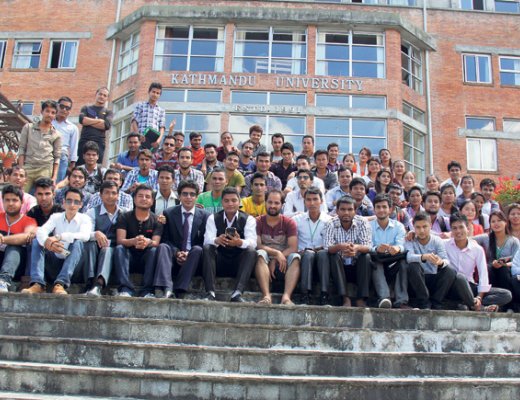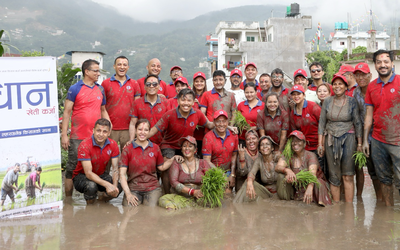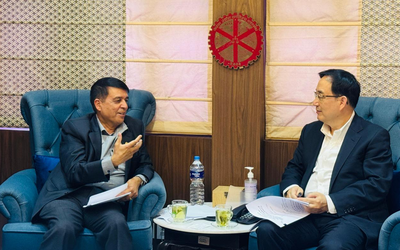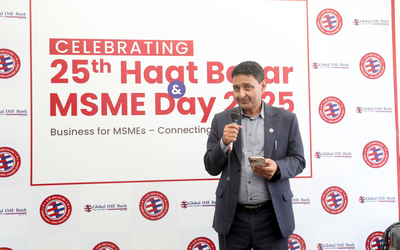
Meena Thapa, 26, from Bijuwar of Pyuthan district, is very happy as she is leaving for a yearlong 'earn and learn' program in Israel. Thapa, a daughter of small farmers, wants to learn to change the agriculture practices in her district.
As she completed her crash course in Kathmandu University, Thapa is ready to fly to Israel where she will have to work and study for almost nine months. “I heard about many stories about Israel where farmers grow the agriculture products. With abundant of water, we can make a difference learning the technology from Israel,” said Thapa.
The idea was implemented by then Israeli ambassador to Nepal Hanan Goddar, who was honored by SKBBL a few months ago for his contribution. Even the present ambassador Yaron Mayer has vigorously supported the program as a way to support Nepal to modernize its agriculture sector.
With a nationwide reach among small farmers, Jalan Kumar Sharma, chief executive of Sana Kisan Bikas Bank Ltd, provides the space to select the candidates for the program.
Having spent his prime lifetime to uplift the life of poor and small farmers in Nepal, CEO Sharma has been searching for various schemes through SKBBL. 'Earn and learn' program is one of his programs to transform Nepalese agriculture sector.
“We are very grateful to Israeli government and ambassador of Israel to Nepal Yaron Mayer for supporting Nepalese small farmers to go to Israel and learn new technology to transform the agriculture program,” said CEO Sharma.
With Sharma’s initiative, youths going to Israel are receiving refreshment training in Kathmandu University. Out of over 1500 students, who received training from Israel, an overwhelming number of students is pursuing agriculture as their profession, transforming Nepal’s agriculture sector from a subsistence to commercial venture.
Launched by Israeli Embassy with the partnership with Sana Kisan Bikas Bank Ltd (SKBBL), the students who are selected from remote villages must be siblings or members of the Sana Kisan Cooperatives (SKC), promoted by SKBBL — a microfinance institution.
The eligibility criteria and qualification for the students include being members of SKC or their family members, aged between 18 and 30, with minimum qualification of higher secondary level or equivalent, according to Jalan Kumar Sharma, CEO of SKBBL.
Although it was started almost three years ago, SKBBL, in collaboration with Kathmandu University (KU), has been providing a crash course for the students who have been selected for the ‘learn and earn’ program. KU has designed a 21-day crash course and around 400 students in two batches have participated in the program.
After reaching Israel, students are admitted to the agriculture institutes of Israel and also get an opportunity to work in the agriculture sector. The duration of the program is 10 months.
According to Sharma, 1,130 students have benefited from this program till date. Among them, 900 have returned to the country and are engaged in agricultural works. The Israeli Embassy in Kathmandu and SKBBL representatives select the students for the program.
“The program has been very helpful in terms of transfer of technology and skills from Israel to Nepal, which in the long run will play an instrumental role in transformation of Nepali agriculture sector,” said Nadav Shemesh, chargé d’affaires of the Embassy of Israel in Kathmandu,
Altogether 450 youths from small farmers' family across the country are set to leave for Israel to study agro technology and skills.
Thapa is among 450 youths, who were selected from among nearly 555,000 small farmers' family associated with nearly 550 Sana Kisan Cooperatives across the country, according to SKBBL.
With a membership of 555,000 small farmers' family associated with nearly 550 Sana Kisan Cooperation, 450 students selected from a pool of 3000 applicants to go to Israel.
"This is an opportunity for the small-scale farmers who rarely get the opportunity to participate in such life-changing exposure and training program. To make the process fair, we selected the name from shortlisted applicants by conducting a lucky draw. It is good news to say that many Israel returnees have been leading various commercial agriculture ventures, while others are helping to transfer their skills and knowledge in their communities,” said Sharma.
Since the establishment of bilateral relations, Israel has been supporting Nepal’s various sectors. As agriculture is the main factor of GDP, this program will help to modernize Nepalese agriculture sector, making it competitive and professional.
- MELAMCHI WATER SUPPLY: No Interruption During Monsoon
- Jun 25, 2025
- KOREAN RETURNEES: Successful Integration
- Jun 25, 2025
- UPPER TRISHULI-1: Engaging With Local
- Jun 25, 2025
- IME GROUP: Twenty Five Years Of Journey
- Jun 24, 2025
- NEPAL’S AIR POLLUTION: A Growing Health Concern
- Jun 24, 2025















